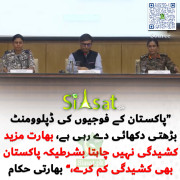foqia khan
MPA (400+ posts)
ANDALUSIA
On Muslim History and Civilization
The Muslims of the Iberian Peninsula, who ruled Spain between 711 and 1492 C.E., are commonly known as the Moors. They called their land Andalus which in the early period of their history also included Portugal and southern France and in the last period only the Kingdom of Granada. The word Andalusia is derived from the Arabic word Al-Andalus which has several meanings. One of them is to become green after a long summer or drought, and the history of the Iberian Peninsula over the ages attests to this phase when Muslims ruled Spain.
In the earliest setback in southern France, the Muslims were defeated at Tours-Poitiers (about two-thirds of the way to Paris) during the month of Ramadan in 732 CE. This place is known as 'The Pavement of the Martyrs' and in Muslim cronicles as Balaat ash-Shuhada'. Muslim control of Toulouse, Narbonne, Lyon and nearby territories varied from time to time, as some of the territories were lost, regained, and then lost. This went on until 975 C.E.
The word Moors is a corrupted word referring to the people who came from Morocco. The Christians of the Iberian Peninsula began to use this term exclusively for Muslims when the Muslims lost administrative control of northern parts of Spain and Portugal. Later, other words such as Moriscos and Mudejares were used for them beginning in the mid-thirteenth century.
When Muslims first arrived in Spain in 711 C.E., they constituted mainly Arabs and Berbers of North Africa. Within two decades a majority of the inhabitants of Andalus, especially most of the Unitarian Christians and the oppressed class, accepted Islam freely in recognition of the peace, security and the freedom of religion and expression under the Muslim rule. (Gothic Princess Sara). By 770 C.E. people of all races from North Africa and Arabia migrated to Andalusia (Spain and Portugal). They intermarried with various nationalities including the native Spanish-Muslim population, with the result that Spain became a fairly homogeneous country within a few generations. During the reign of Abdur-Rahman, the 'Falcon of Andalus' (755-788), they began the work of building an Islamic civilization similar to the one already flourishing in Damascus, Baghdad and its many regional centers. Within a century of their activity, they had developed a civilization far in advance of any in Europe. Their great contribution is commonly known as the Moorish Civilization.
Quotations :
Stanley Lane-Poole in The Moors in Spain: Introduction.
"For nearly eight centuries, under the Mohamedan rule, Spain set all Europe a shining example of a civilized and enlightened state. Her fertile provinces rendered doubly prolific, by the industrious engineering skill of the conquerors bore fruit a hundredfold, cities innumerable sprang up in the rich valleys in the Guadalquivir and the Guadiana whose names, and names only commemorate the vanished glories of their past.
"...To Cordoba belong all the beauty and ornaments that delight the eye or dazzle the sight. Her long line of Sultans form her crown of glory; her necklace is strung with the pearls which her poets have gathered from the ocean of language; her dress is of the banners of learning, well-knit together by her men of science; and the masters of every art and industry are the hem of her garments.
"Art, literature and science prospered as they then prospered nowhere else in Europe...
"Mathematics, astronomy, botany, history, philosophy and jurisprudence were to be mastered in Spain, and Spain alone. Whatever makes a kingdom great and prosperous, whatever tends to refinement and civilization, was found in Muslim Spain...
"With Granada fell all Spain's greatness. For a brief while, indeed, the reflection of the Moorish splendour cast a borrowed light upon the history of the land which it had once warmed with its sunny radiance. The great epoch of Isabella, Charles V and Philip II, of Columbus, Cortes and Pizarro, shed a last halo about the dying monuments of a mighty state. When followed the abomination of dissolution, the rule of inquisition and the blackness of darkness in which Spain has been plunged ever since.
"In the land where science was once supreme, the Spanish doctors became noted for nothing but their ignorance and incapacity. The arts of Toledo and Almeria faded into insignificance.
"The land deprived of skillful irrigation of the Moors, grew improvished and neglected, the richest and most fertile valleys languished and were deserted, and most of the populous cities which had filled every district in Andalusia, fell into ruinous decay; and beggars, friars, and bandits took the place of scholars, merchants and knights. So low fell Spain when she had driven away the Moors. Such is the melancholy contrast offered by her history."
Conde as Quoted in Prescott, Philip II of Spain, Vol. III.
"And so vanquished for ever from the Spanish territory this brave, intelligent and enlightened people, who with their resolution and labour inspired life into the land, which the vain pride of the Goths condemned to sterility, and endowed it with prosperity and abundance and with innumerable canals, this people whose admirable courage was likewise, in happiness and adversity, a strong rampart to the throne of the Caliphs, whose genius, progress and study raised in its cities an internal edifice of light which sent its rays into Europe and inspired it with the passion of study, and whose magnanimous spirit tinted all its acts with an unrivalled colour of grandeur and nobility, and endowed it in the eyes of posterity with a sort of extraordinary greatness and charming colour of heroism which invokes the magical ages of Homer and which presents them to us in the garb of Greek half-gods.
"The Arabs suddenly appeared in Spain like a star which crosses through the air with its light, spreads its flames on the Horizon and then vanishes rapidly into naught. They appeared in Spain to fill her suddenly with their activity and the fruit of their genius, and endowed her with a glorious glamour which enveloped her from the Pyrenees to Gibraltar and from the oceans to the Barcelona. But a burning love for liberty and independance, a fickle character disposed to frivolty and merriness, neglect of old virtues, an unfortunate disposition of revolution, provoked always by an inflamed imagination, violent passions and ambitions, a spirit to dominate, and other factors of decay, worked in the course of time, to demolish this grand edifice raised by men like Tariq, 'Abdul Rahman al-Nasir, Muhammad ibn al-Ahmer, and led the Arabs to internal dissention, which sapped their power and pushed them to the abyss of naught.
"Millions of Moors quitted Spain carrying their property and arts - the patrimony of a state. What have the Spaniards created in their place? We could say nothing, but an eternal sorrow fills this land in which the gayest natures breathed before. Indeed there are some ruined monuments which still look upon these gloomy districts, but a real cry resounds from the depths of these monuments and ruins: honour and glory to the conquered Moor and decay and misery to the victorious Spaniard!"
Martin Hume in 'Spainish People'
"The Sultan Abd-er-Rahman was one of the Heaven-sent rulers of men. Prompt yet cautious in council and in war, unscrupulous, overbearing and proud, he was as ready to wreak terrible vengeance, as he was politic to forgive when it suited him. Berber and Yamanite alike acknowledged that at last they had found their master....He ruled until his death, in 788, with the tempered severity, wisdom, and justice which made his domain the best organized in Europe, and his capital the most splendid in the world."
S.P. Scott in 'The History of the Moorish Empire in Europe.'
"Yet there were knowledge and learning everywhere except in Catholic Europe. At a time when even kings could not read or write, a Moorish king had a private library of six hundred thousand books. At a time when ninety-nine percent of the Christian people were wholly illiterate, the Moorish city of Cordova had eight hundred public schools, and there was not a village within the limits of the empire where the blessings of education could not be enjoyed by the children of the most indigent peasant, ...and it was difficult to encounter even a Moorish peasant who could not read and write."
Dozy in 'The Moslems in Spain.'
Cruel and fanatical, the Leonese rarely gave quarter; when they captured a town they usually put all the inhabitants to the sword. Tolerance such as that accorded by the Muslims to the Christians could not be expected of them.
H. Kamen, 'The Spanish Inquisition.'
"As a result of his (Cardinal Ximenes' coercive) endeavours, it is reported that on l8th December 1499 about three thousand Moors were baptized by him and a leading mosque in Granada was converted into a church. 'Converts' were encouraged to surrender their Islamic books, several thousands of which were destroyed by Ximenes in a public bonfire. A few rare books on medicine were kept aside for the University of Alcala...(Ximenes) claimed...the Moors had forfeited all their rights under the terms of capitulation (of Granada). They should therefore be given the choice between baptism and expulsion...At Andarax the principal mosque, in which the women and children had taken refuge, was blown up with gun-powder...all books in Arabic, especially the Qur'an, were collected to be burnt...Cardinal Ximenes:...was reported during his conversion campaign among the Granada Moors in 1500 to have burnt in the public square of Vivarrambla over 1,005,000 volumes including unique works of Moorish culture."
H.C. Lea, 'The Moriscos of Spain.'
"...that cemeteries could be established near the churches changed from mosques, but old Christians were not to be debarred from burial there if they wished....it continued until 1591 when it was ordered that they should be buried inside of the churches, which was so abhorrent to them that they vainly offered more than thirty thousand ducats if king or pope would allow them to be interred elsewhere, even though in dunghills.
"... tailors were not to make garments nor silver-smiths jewels after their (Moorish) fashion; their baths were prohibited; all births were to be watched by Christian midwives to see that no Moorish rites were performed; disarmament was to be enforced by a rigid inspection of licences; their doors were to be kept open on feast-days, Fridays, Saturdays, and during weddings, to see that Moorish rites were abandoned and Christian ones observed...no Moorish names were to be used and they were not to keep 'gacis' or unbaptised Moors either free or as slaves.
History:
At the end of the Eighth Century, the whole of Andalusia was the most populous, cultured and industrious land of all Europe, and remained so for centuries. Its trade with the outside world was unrivaled, and in this time of economic expansion, the Jews, who had been virtually eliminated from the peninsula in the seventh century by the Christians, grew once more in numbers and flourished. The following description of their position is to be found in Hume's Spanish People:
Side by side with the new rulers lived the Christians and Jews in peace. The latter rich with commerce and industry were content to let the memory of their oppression by the priest-ridden Goths sleep, now that the prime authors of it had disappeared. Learned in all the arts and sciences, cultured and tolerant, they were treated by the Moors with marked respect, and multiplied exceedingly all over Spain; and, like the Christian Spaniards under Moorish rule - who were called Mozarabes - had cause to thank their now masters for an era of prosperity such as they had never known before.
This tolerance of the Jews and Christians by the Muslims, characterized the early centuries of Islam in Spain. All the Jews and Christians who accepted the Muslims as the rulers of the country were allowed to retain their possessions and their beliefs and religious practices, and to continue their way of life within the framework of the society despite the fact that both these communities denied the continuance of the prophetic tradition beyond their respective prophets, Moses and Jesus, on whom be peace. The Muslims gave the Christians the freedom to make up their own minds. As long as the Muslims of Spain followed the guidance they had been given, they did not molest the Christians and, writes Gibbon:
In a time of tranquillity and justice, the Christians have never been compelled to renounce the Gospel or to embrace the Qur'an.
As in the time of the reign of Theodoric, King of the Ostrogoths, in Italy, however, the Catholic Church was not content with this arrangement. Its members felt bound to impose the official religion on anyone who would not accept their point of view. In the guidance of Islam, there are provisions for the tolerance and acceptance of the Christians and the Jews, the 'people of the Book'. In the religion of the Official Church there was only intolerance and rejection of any religion other than the one it had formulated. By claiming that God had become man, and died for humanity so that everyone who believed this would go straight to 'heaven', it logically followed that there was no longer any need for a prophet on earth. A man could do what he pleased and still go to heaven provided that he bowed before the cross and said he believed in Christ. The appearance of another prophet after Jesus (pbuh), the Prophet Muhammad (pbuh), was therefore very embarrassing for the Official Christians, especially when so many people accepted his guidance. In its attempts to fulfill its claims and aspirations, the Church was bound to try and subvert Islam, and to eradicate the Muslims, in the same way that it had eliminated the Unitarian followers of Jesus before them.
While the Muslims held to the guidance they had been given, they were protected. As with the Arian Goths, the Muslims became vulnerable to the activities of the Catholic Church, once they began to wander from the guidance they had been given; the dynamic process of flowering in which the community of Cordoba bloomed during the ninth and tenth centuries, inevitably meant that the original simplicity of its first Muslim inhabitants was lost. The richer it became the further it departed from the blue-print of the first community in Madina al-Munawwara, which had been richest when its members were most poor. The Prophet said that he did not fear poverty for his community but riches. He also said that every nation has its trial, and that the trial of the Muslims would be wealth.
Those who fought to maintain or restore the practice of Islam in all its aspects thus found themselves fighting not only the Christians, but also the so-called Muslims. It was a hopeless struggle. They found themselves in a process of collapse and decay which could not be reversed. As long as the Muslims of Andalusia had remained united in their practice of Islam, they had continued to expand. As soon as they divided, their numbers began to diminish, and the Christians were able to commence the business of taking over the country. Furthermore, because of the unfortunate split between the East and the West within the Ummah of Islam, no help from the Muslims in the East was forthcoming. This disunity was one of the fundamental factors which contributed towards the eventual elimination of Islam from Spain, for it was a weakness of which the Christians took full advantage.
Once the Muslims in Andalus had divided, the armies of the Church gained a foothold in the country and, aided by the Christians living within the Muslim domains, who had grown in numbers and flourished under the tolerant Muslim rule, their hold over the country continued to grow. As in the case of Theodoric, King of the Ostrogoths, the atrocities committed by the advancing Christian armies moved the Muslims to take revenge on the Christians within their kingdoms. This only weakened their position in the land, and increased the determination of the Christians to conquer them. Retaliation brought about retaliation. Intolerance bred intolerance. Revenge stimulated revenge....
Commencing with the Burgundian Crusades of 1017, the precursors of the more notorious crusades to the east, the Christians began to make significant inroads into the Iberian peninsula. The taking of Barbastro in 1064, in which thousands of Muslims were slaughtered immediately upon a long siege having been lifted after the two sides had signed a peace treaty, set off a grim pattern for the reconquest of Andalusia by the Christians:
It was an invariable custom with the Christians, whenever they took a town by force of arms, to ravish the daughters in the presence of their fathers, and the women before the eyes of their husbands and families. But on the taking of Barbastro the excesses of this kind committed by thorn pass all belief; the Muslims had never before experienced anything like it. In short, such were the crimes and excesses committed by the Christians on this occasion that there is no pen eloquent enough to describe them.
http://www.cyberistan.org/islamic/andalusia.html
http://www.islamreligion.com/category/89/
On Muslim History and Civilization
The Muslims of the Iberian Peninsula, who ruled Spain between 711 and 1492 C.E., are commonly known as the Moors. They called their land Andalus which in the early period of their history also included Portugal and southern France and in the last period only the Kingdom of Granada. The word Andalusia is derived from the Arabic word Al-Andalus which has several meanings. One of them is to become green after a long summer or drought, and the history of the Iberian Peninsula over the ages attests to this phase when Muslims ruled Spain.
In the earliest setback in southern France, the Muslims were defeated at Tours-Poitiers (about two-thirds of the way to Paris) during the month of Ramadan in 732 CE. This place is known as 'The Pavement of the Martyrs' and in Muslim cronicles as Balaat ash-Shuhada'. Muslim control of Toulouse, Narbonne, Lyon and nearby territories varied from time to time, as some of the territories were lost, regained, and then lost. This went on until 975 C.E.
The word Moors is a corrupted word referring to the people who came from Morocco. The Christians of the Iberian Peninsula began to use this term exclusively for Muslims when the Muslims lost administrative control of northern parts of Spain and Portugal. Later, other words such as Moriscos and Mudejares were used for them beginning in the mid-thirteenth century.
When Muslims first arrived in Spain in 711 C.E., they constituted mainly Arabs and Berbers of North Africa. Within two decades a majority of the inhabitants of Andalus, especially most of the Unitarian Christians and the oppressed class, accepted Islam freely in recognition of the peace, security and the freedom of religion and expression under the Muslim rule. (Gothic Princess Sara). By 770 C.E. people of all races from North Africa and Arabia migrated to Andalusia (Spain and Portugal). They intermarried with various nationalities including the native Spanish-Muslim population, with the result that Spain became a fairly homogeneous country within a few generations. During the reign of Abdur-Rahman, the 'Falcon of Andalus' (755-788), they began the work of building an Islamic civilization similar to the one already flourishing in Damascus, Baghdad and its many regional centers. Within a century of their activity, they had developed a civilization far in advance of any in Europe. Their great contribution is commonly known as the Moorish Civilization.
Quotations :
Stanley Lane-Poole in The Moors in Spain: Introduction.
"For nearly eight centuries, under the Mohamedan rule, Spain set all Europe a shining example of a civilized and enlightened state. Her fertile provinces rendered doubly prolific, by the industrious engineering skill of the conquerors bore fruit a hundredfold, cities innumerable sprang up in the rich valleys in the Guadalquivir and the Guadiana whose names, and names only commemorate the vanished glories of their past.
"...To Cordoba belong all the beauty and ornaments that delight the eye or dazzle the sight. Her long line of Sultans form her crown of glory; her necklace is strung with the pearls which her poets have gathered from the ocean of language; her dress is of the banners of learning, well-knit together by her men of science; and the masters of every art and industry are the hem of her garments.
"Art, literature and science prospered as they then prospered nowhere else in Europe...
"Mathematics, astronomy, botany, history, philosophy and jurisprudence were to be mastered in Spain, and Spain alone. Whatever makes a kingdom great and prosperous, whatever tends to refinement and civilization, was found in Muslim Spain...
"With Granada fell all Spain's greatness. For a brief while, indeed, the reflection of the Moorish splendour cast a borrowed light upon the history of the land which it had once warmed with its sunny radiance. The great epoch of Isabella, Charles V and Philip II, of Columbus, Cortes and Pizarro, shed a last halo about the dying monuments of a mighty state. When followed the abomination of dissolution, the rule of inquisition and the blackness of darkness in which Spain has been plunged ever since.
"In the land where science was once supreme, the Spanish doctors became noted for nothing but their ignorance and incapacity. The arts of Toledo and Almeria faded into insignificance.
"The land deprived of skillful irrigation of the Moors, grew improvished and neglected, the richest and most fertile valleys languished and were deserted, and most of the populous cities which had filled every district in Andalusia, fell into ruinous decay; and beggars, friars, and bandits took the place of scholars, merchants and knights. So low fell Spain when she had driven away the Moors. Such is the melancholy contrast offered by her history."
Conde as Quoted in Prescott, Philip II of Spain, Vol. III.
"And so vanquished for ever from the Spanish territory this brave, intelligent and enlightened people, who with their resolution and labour inspired life into the land, which the vain pride of the Goths condemned to sterility, and endowed it with prosperity and abundance and with innumerable canals, this people whose admirable courage was likewise, in happiness and adversity, a strong rampart to the throne of the Caliphs, whose genius, progress and study raised in its cities an internal edifice of light which sent its rays into Europe and inspired it with the passion of study, and whose magnanimous spirit tinted all its acts with an unrivalled colour of grandeur and nobility, and endowed it in the eyes of posterity with a sort of extraordinary greatness and charming colour of heroism which invokes the magical ages of Homer and which presents them to us in the garb of Greek half-gods.
"The Arabs suddenly appeared in Spain like a star which crosses through the air with its light, spreads its flames on the Horizon and then vanishes rapidly into naught. They appeared in Spain to fill her suddenly with their activity and the fruit of their genius, and endowed her with a glorious glamour which enveloped her from the Pyrenees to Gibraltar and from the oceans to the Barcelona. But a burning love for liberty and independance, a fickle character disposed to frivolty and merriness, neglect of old virtues, an unfortunate disposition of revolution, provoked always by an inflamed imagination, violent passions and ambitions, a spirit to dominate, and other factors of decay, worked in the course of time, to demolish this grand edifice raised by men like Tariq, 'Abdul Rahman al-Nasir, Muhammad ibn al-Ahmer, and led the Arabs to internal dissention, which sapped their power and pushed them to the abyss of naught.
"Millions of Moors quitted Spain carrying their property and arts - the patrimony of a state. What have the Spaniards created in their place? We could say nothing, but an eternal sorrow fills this land in which the gayest natures breathed before. Indeed there are some ruined monuments which still look upon these gloomy districts, but a real cry resounds from the depths of these monuments and ruins: honour and glory to the conquered Moor and decay and misery to the victorious Spaniard!"
Martin Hume in 'Spainish People'
"The Sultan Abd-er-Rahman was one of the Heaven-sent rulers of men. Prompt yet cautious in council and in war, unscrupulous, overbearing and proud, he was as ready to wreak terrible vengeance, as he was politic to forgive when it suited him. Berber and Yamanite alike acknowledged that at last they had found their master....He ruled until his death, in 788, with the tempered severity, wisdom, and justice which made his domain the best organized in Europe, and his capital the most splendid in the world."
S.P. Scott in 'The History of the Moorish Empire in Europe.'
"Yet there were knowledge and learning everywhere except in Catholic Europe. At a time when even kings could not read or write, a Moorish king had a private library of six hundred thousand books. At a time when ninety-nine percent of the Christian people were wholly illiterate, the Moorish city of Cordova had eight hundred public schools, and there was not a village within the limits of the empire where the blessings of education could not be enjoyed by the children of the most indigent peasant, ...and it was difficult to encounter even a Moorish peasant who could not read and write."
Dozy in 'The Moslems in Spain.'
Cruel and fanatical, the Leonese rarely gave quarter; when they captured a town they usually put all the inhabitants to the sword. Tolerance such as that accorded by the Muslims to the Christians could not be expected of them.
H. Kamen, 'The Spanish Inquisition.'
"As a result of his (Cardinal Ximenes' coercive) endeavours, it is reported that on l8th December 1499 about three thousand Moors were baptized by him and a leading mosque in Granada was converted into a church. 'Converts' were encouraged to surrender their Islamic books, several thousands of which were destroyed by Ximenes in a public bonfire. A few rare books on medicine were kept aside for the University of Alcala...(Ximenes) claimed...the Moors had forfeited all their rights under the terms of capitulation (of Granada). They should therefore be given the choice between baptism and expulsion...At Andarax the principal mosque, in which the women and children had taken refuge, was blown up with gun-powder...all books in Arabic, especially the Qur'an, were collected to be burnt...Cardinal Ximenes:...was reported during his conversion campaign among the Granada Moors in 1500 to have burnt in the public square of Vivarrambla over 1,005,000 volumes including unique works of Moorish culture."
H.C. Lea, 'The Moriscos of Spain.'
"...that cemeteries could be established near the churches changed from mosques, but old Christians were not to be debarred from burial there if they wished....it continued until 1591 when it was ordered that they should be buried inside of the churches, which was so abhorrent to them that they vainly offered more than thirty thousand ducats if king or pope would allow them to be interred elsewhere, even though in dunghills.
"... tailors were not to make garments nor silver-smiths jewels after their (Moorish) fashion; their baths were prohibited; all births were to be watched by Christian midwives to see that no Moorish rites were performed; disarmament was to be enforced by a rigid inspection of licences; their doors were to be kept open on feast-days, Fridays, Saturdays, and during weddings, to see that Moorish rites were abandoned and Christian ones observed...no Moorish names were to be used and they were not to keep 'gacis' or unbaptised Moors either free or as slaves.
History:
At the end of the Eighth Century, the whole of Andalusia was the most populous, cultured and industrious land of all Europe, and remained so for centuries. Its trade with the outside world was unrivaled, and in this time of economic expansion, the Jews, who had been virtually eliminated from the peninsula in the seventh century by the Christians, grew once more in numbers and flourished. The following description of their position is to be found in Hume's Spanish People:
Side by side with the new rulers lived the Christians and Jews in peace. The latter rich with commerce and industry were content to let the memory of their oppression by the priest-ridden Goths sleep, now that the prime authors of it had disappeared. Learned in all the arts and sciences, cultured and tolerant, they were treated by the Moors with marked respect, and multiplied exceedingly all over Spain; and, like the Christian Spaniards under Moorish rule - who were called Mozarabes - had cause to thank their now masters for an era of prosperity such as they had never known before.
This tolerance of the Jews and Christians by the Muslims, characterized the early centuries of Islam in Spain. All the Jews and Christians who accepted the Muslims as the rulers of the country were allowed to retain their possessions and their beliefs and religious practices, and to continue their way of life within the framework of the society despite the fact that both these communities denied the continuance of the prophetic tradition beyond their respective prophets, Moses and Jesus, on whom be peace. The Muslims gave the Christians the freedom to make up their own minds. As long as the Muslims of Spain followed the guidance they had been given, they did not molest the Christians and, writes Gibbon:
In a time of tranquillity and justice, the Christians have never been compelled to renounce the Gospel or to embrace the Qur'an.
As in the time of the reign of Theodoric, King of the Ostrogoths, in Italy, however, the Catholic Church was not content with this arrangement. Its members felt bound to impose the official religion on anyone who would not accept their point of view. In the guidance of Islam, there are provisions for the tolerance and acceptance of the Christians and the Jews, the 'people of the Book'. In the religion of the Official Church there was only intolerance and rejection of any religion other than the one it had formulated. By claiming that God had become man, and died for humanity so that everyone who believed this would go straight to 'heaven', it logically followed that there was no longer any need for a prophet on earth. A man could do what he pleased and still go to heaven provided that he bowed before the cross and said he believed in Christ. The appearance of another prophet after Jesus (pbuh), the Prophet Muhammad (pbuh), was therefore very embarrassing for the Official Christians, especially when so many people accepted his guidance. In its attempts to fulfill its claims and aspirations, the Church was bound to try and subvert Islam, and to eradicate the Muslims, in the same way that it had eliminated the Unitarian followers of Jesus before them.
While the Muslims held to the guidance they had been given, they were protected. As with the Arian Goths, the Muslims became vulnerable to the activities of the Catholic Church, once they began to wander from the guidance they had been given; the dynamic process of flowering in which the community of Cordoba bloomed during the ninth and tenth centuries, inevitably meant that the original simplicity of its first Muslim inhabitants was lost. The richer it became the further it departed from the blue-print of the first community in Madina al-Munawwara, which had been richest when its members were most poor. The Prophet said that he did not fear poverty for his community but riches. He also said that every nation has its trial, and that the trial of the Muslims would be wealth.
Those who fought to maintain or restore the practice of Islam in all its aspects thus found themselves fighting not only the Christians, but also the so-called Muslims. It was a hopeless struggle. They found themselves in a process of collapse and decay which could not be reversed. As long as the Muslims of Andalusia had remained united in their practice of Islam, they had continued to expand. As soon as they divided, their numbers began to diminish, and the Christians were able to commence the business of taking over the country. Furthermore, because of the unfortunate split between the East and the West within the Ummah of Islam, no help from the Muslims in the East was forthcoming. This disunity was one of the fundamental factors which contributed towards the eventual elimination of Islam from Spain, for it was a weakness of which the Christians took full advantage.
Once the Muslims in Andalus had divided, the armies of the Church gained a foothold in the country and, aided by the Christians living within the Muslim domains, who had grown in numbers and flourished under the tolerant Muslim rule, their hold over the country continued to grow. As in the case of Theodoric, King of the Ostrogoths, the atrocities committed by the advancing Christian armies moved the Muslims to take revenge on the Christians within their kingdoms. This only weakened their position in the land, and increased the determination of the Christians to conquer them. Retaliation brought about retaliation. Intolerance bred intolerance. Revenge stimulated revenge....
Commencing with the Burgundian Crusades of 1017, the precursors of the more notorious crusades to the east, the Christians began to make significant inroads into the Iberian peninsula. The taking of Barbastro in 1064, in which thousands of Muslims were slaughtered immediately upon a long siege having been lifted after the two sides had signed a peace treaty, set off a grim pattern for the reconquest of Andalusia by the Christians:
It was an invariable custom with the Christians, whenever they took a town by force of arms, to ravish the daughters in the presence of their fathers, and the women before the eyes of their husbands and families. But on the taking of Barbastro the excesses of this kind committed by thorn pass all belief; the Muslims had never before experienced anything like it. In short, such were the crimes and excesses committed by the Christians on this occasion that there is no pen eloquent enough to describe them.
http://www.cyberistan.org/islamic/andalusia.html
http://www.islamreligion.com/category/89/






























